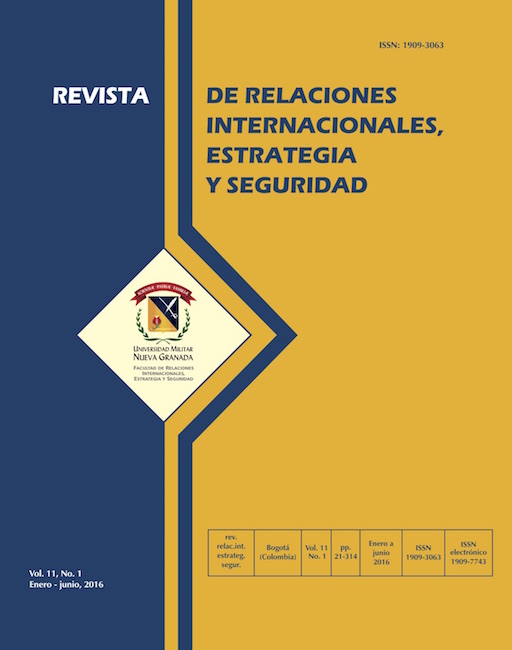A teória das relações internacionais sob uma perspectiva feminista
Resumo
A lógica sociológica no estudo das relações internacionais está baseada no reconhecimento das relações assimétricas de poder. Desde este enfoque, como acontece no realismo e o neorrealismo, e as teorias que têm surgido de aí, têm permitido o desenvolvimento das perspectivas dos estudos de género e feminismo, onde o principio epistemológicos é a relação assimétrica entre homes e mulheres em seus roles sociais, culturais, econômicos, políticos, etc. Assim, a perspectiva feminista sobre relações internacionais introduziu o conceito de gênero como uma ferramenta essencial para o estudo das interações entre os Estados e a nível internacional. No entanto, apesar desses esforços para construir uma melhor teoria das relações internacionais, análise feminista teve pouco impacto sobre as políticas internacionais. O objetivo deste ensaio é analisar o valor da adopção de uma perspectiva feminista em relações internacionais.Downloads
##plugins.generic.ArticleMetadataByBiteca.languages##:
enReferências
Acker, J. (2000). Hierarchies, jobs, bodies: a theory of gendered organizations. Gender and Society. 139-158.
Allen, A. (1998). Rethinking power. Hypatia. 21-40. http://dx.doi.org/10.1111/j.1527-2001.1998.tb01350.x
Brown, S. (1998). Feminist International theory and international relations of gender inequality in millennium. Journal of International Studies. 461-475.
Byron, J. & Thorburn, J. (1998). Gender and international relations: A global perspective and issues for the Caribbean. Feminist Review. 211-232 http://dx.doi.org/10.1080/014177898339532
Cockburn, C. (1991). In the way of women: men's resistance to sex equality in organizations. London: Zed Books. http://dx.doi.org/10.1007/978-1-349-21571-3
Enloe, C. (1990). Bananas, Beaches and Bases: Making Feminist Sense of International Politics. Berkeley: University of California Press.
Enloe, C. (1993). Bananas, Beaches and Bases. In Kaufman, L. American Feminist Thought at Century's End: A reader. (pp. 441-464). Cambrigde: Blackwell.
Grant, R. & Newland, K. (Ed.) (1991). Gender and International Relations. Indiana: Indiana University Press.
Hutchings, K. (1999). International Political Theory. London: SAGE Publications. http://dx.doi.org/10.1038/23680
Ingham, B. (1995). Economics and Development. England: McGraw-Hill Book Company.
Jones, A. (1996). Does gender make the world go round? Feminist critiques of International Relations. Review of International Studies. 405-429. http://dx.doi.org/10.1017/S0260210500118649
Kardam, N. (1991). Bringing Women in: Women's Issues in International Development Program. London: Reinner Publishers.
Kofman, E. & Youngs, G. (2008). Globalization Theory and Practice. New York: Pinter Dub.
Logan, M. & Huntley, H. (2001). Gender and power in the research process. Women's Studies International Forum. 13. 623-635. doi: 10.1016/S0277-5395(01)00204-7 http://dx.doi.org/10.1016/S0277-5395(01)00204-7
Nicolás, M. (2005). Resistencias teóricas y prácticas a la integración de la metodología feminista en la disciplina de Relaciones Internacionales. Revista Académica de Relaciones Internacionales. 2. 1-16. http://www.relacionesinternacionales.info/ojs/article/view/186/171.html
Peterson, S. (1992). Gender State: Feminist Revision of International Relations Theory. Boulder: Lynne Rienner.
Peterson, S. (1992). Gender State: Feminist Revision of International Relations Theory. Boulder: Lynne Rienner.
Pettman, J. (2001). Gender Issues. In. Baylis, J.; Smith, S. & Owens, P. The Globalization of World Politics. An introduction of international relations. (258-273). London: Oxford University Press.
Randal, V. (1982). Women and Politics. Great Britain: Macmillan. http://dx.doi.org/10.1007/978-1-349-16880-4
Rosenau, J. (1982). Women leaders and foreing policy options. In Boneparth, E. Women, Power and Policy. (p. 336). New York: Pergamon Press.
Runyan, A. & Peterson, S. (1991). The Radical Future of Realism: Feminist Subversion of IR Theory. Alternatives. 16(1). 67-106. http://dx.doi.org/10.1177/030437549101600103
Sylvester, C. (1994). Feminist Theory and International Relations in a Post Moder Era. Cambridge: Cambridge University Press.
Tickner, A. (1997). You just don't understand: Troubled engagements between feminist and ir theorists. International Studies Quarterly. 41(4). 611-632. http://dx.doi.org/10.1111/1468-2478.00060
Tickner, A. (2005). What is your research program? Some feminist answers to international relations methodological questions. International Studies Quarterly. 49(1). 1-21. http://dx.doi.org/10.1111/j.0020-8833.2005.00332.x
Tickner, A. (1992). Gender in International Relations, Femenist Perspective on Achieving Global Security. New York: Columbia University Press.
Todaro, M. (2000). Economic Development. England: Addison-Wesley.
True, J. (2001). Feminism. In. Burchill, S. & Linklater, A. (Ed.), Theories of International Relations. (pp. 241-265). New York: Palgrave.
Whitworth, S. (2001). The practice, and praxis of femenist research in international relationships. In. Jones, R. (Ed.). Critical Theory and World Politics. (pp. 149-160). Boulder: Lynne Rienner Publishers.
Zalewsky, M. (1995). Well, what is the feminist perspective on Bosnia? International Affairs. 71(2). 339-356. http://dx.doi.org/10.2307/2623438
| Métricas do artigo | |
|---|---|
| Vistas abstratas | |
| Visualizações da cozinha | |
| Visualizações de PDF | |
| Visualizações em HTML | |
| Outras visualizações | |












